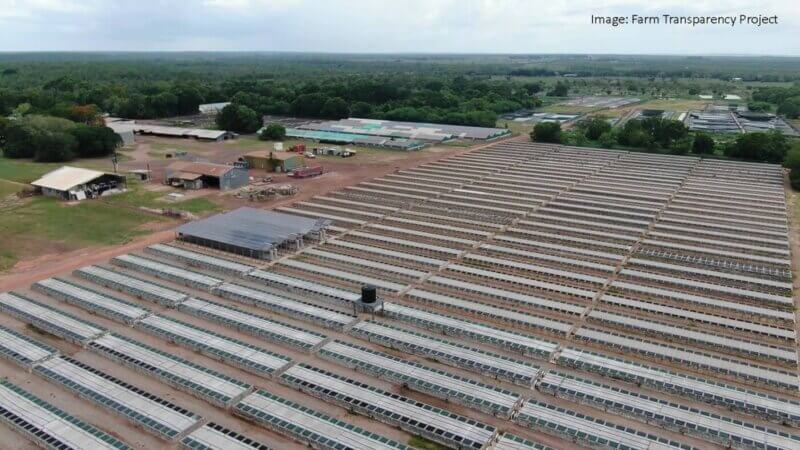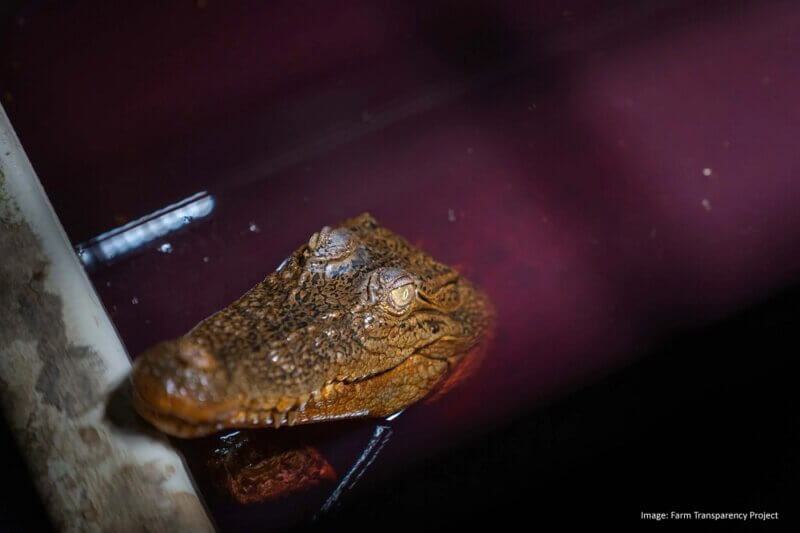
Australia's crocodile breeding industry supplies “luxury” brands, but there is nothing luxurious about what happens to crocodiles slaughtered for their skins.
New witness footage provided to the Kindness Project reveals that Australian crocodiles are subjected to appalling cruelty, from hatching to when screwdrivers are driven into their heads to destroy their brains - all for bags, belts and boots.
The video documents the practices of four farms in the Northern Territory - Australia's largest producer of crocodile skin - all linked to the Hermès brand.
In huge warehouses, thousands of crocodiles are confined in austere concrete enclosures, with little more than the length of their bodies to move.
When they are 2 or 3 years old - only a fraction of their natural lifespan - they are electrocuted and pulled out of their enclosure while their bodies are in seizures. Workers then shot them at the top of their heads with a captive armor-piercing pistol and severed their spine with a knife. A screwdriver is then driven into the wound, in an attempt to jam the crocodile's brain. Some crocodiles have been observed moving for more than a minute after undergoing this treatment.
At least three crocodiles must endure this ordeal to make a single Hermès bag.
PETA and its international affiliates have previously denounced the cruelty of reptile farms in Texas, Zimbabwe and Vietnam and the story remains the same: grim lockdown and violent death.

Crocodile farming: a lie about conservation
Australia's crocodile breeding industry bills itself as an industry invested in animal conservation, but this claim does not hold up after close scrutiny.
From 1945 to 1971, crocodile populations were wiped out in the Northern Territory because they were hunted for their skin. Fortunately, crocodiles were protected in 1971, and their numbers have since stabilized.
The crocodile breeding industry likes to take credit for this, claiming that “harvesting” (stealing) eggs from natural environments and raising crocodiles on factory farms makes community members locals more willing to live alongside predators because they generate money.
Crocodiles can be dangerous for those who enter their territory, but they are also sentient beings who feel pain and fear. They are protective and caring parents and often have fun blowing bubbles. If left alone, they can survive longer than most humans.
Catching and raising native animals for the sole purpose of slaughtering them for their skins is not conservation, and certainly not ethical. The increase in the sea crocodile population is the result of the hunting ban, not because people have decided they can profit from their breeding and butchering.

Exotic skin and zoonotic diseases
Because crocodiles raised on farms for their skin are kept crammed in deplorable sanitary conditions - sometimes on top of each other in pits of putrid water - conservation experts warn the next pandemic could come from The fashion industry.
Just like the “wet market” from which the COVID-19 pandemic started, crocodile farms are fertile ground for the proliferation of many zoonotic pathogens, such as salmonella, vibrio, Aeromonas spp. , Pseudomonas spp. , E. coli , trichina and West Nile virus, which crocodilians have been found to carry and can transmit to humans.
Hermès plans to create Australia's largest crocodile farm
Australia accounts for 60% of the world trade in marine crocodile skins, 90% of which is exported abroad. Hermès plans to expand its activities there by building Australia's largest farm and imprisoning up to 50,000 animals at a time.
This decision comes at a time when exotic skin is no longer in fashion. Chanel, Tommy Hilfiger, Calvin Klein, Mulberry, HUGO BOSS and Victoria Beckham have all banned crocodile and other exotic skins from their collections.
Hermès should invest in human, sustainable and promising projects, and not build new factory farms to torment animals and create a breeding ground for new epidemics.
Posted on 2021-09-23 19:55








Comments